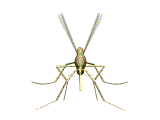The following is the conclusion of a health travel advisory issued tonight by the Public Health Agency of Canada:
********************** Antimalarial medication (prophylaxis)
Antimalarial medications decrease the risk of developing symptomatic malaria.
However, they do not provide 100 percent protection against the disease.
Your individual need for antimalarial medications should be discussed with your physician or travel medicine professional several weeks before travel.
If your physician or travel medicine clinic prescribes an antimalarial medication, it is important that you take it as directed in order to maximize the protective effect.
Each drug has its own dosing regime that should be strictly followed.
Because of the incubation period of the disease, these medications must be taken both before, during, and after travel.
Travellers are reminded to complete their prescribed regimen of prophylaxis on their return.
Atovaquone/proguanil must be taken for one week after returning from a malaria-endemic area.
Chloroquine, doxycyline and mefloquine must be taken for four weeks after returning from a malaria-endemic area.
For travellers who opt not to take malaria prophylaxis during their travel, PHAC does not recommend that they start chemoprophylaxis on their return home to Canada but advises that individuals seek immediate medical attention should they develop a fever and inform their physician that they have visited an area where malaria occurs so that they can be tested without delay.
Important to note:
If you develop a fever within three months after returning from an area where malaria occurs, you should seek medical advice immediately.
Be sure to inform your physician that you have visited an area where malaria occurs so that you can be tested without delay.
Malaria must be ruled out by the examination of one or more blood films under a microscope.
As a reminder...
The Public Health Agency of Canada routinely recommends that Canadian international travellers consult their personal physician or a travel clinic four to six weeks prior to international travel, regardless of destination, for an individual risk assessment to determine their individual health risks and their need for vaccination, preventative medication, and personal protective measures.
The Public Health Agency of Canada recommends, as well, that travellers who become sick or feel unwell on their return to Canada should seek a medical assessment with their personal physician. Travellers should inform their physician, without being asked, that they have been travelling or living outside of Canada, and where they have been.
*********************
